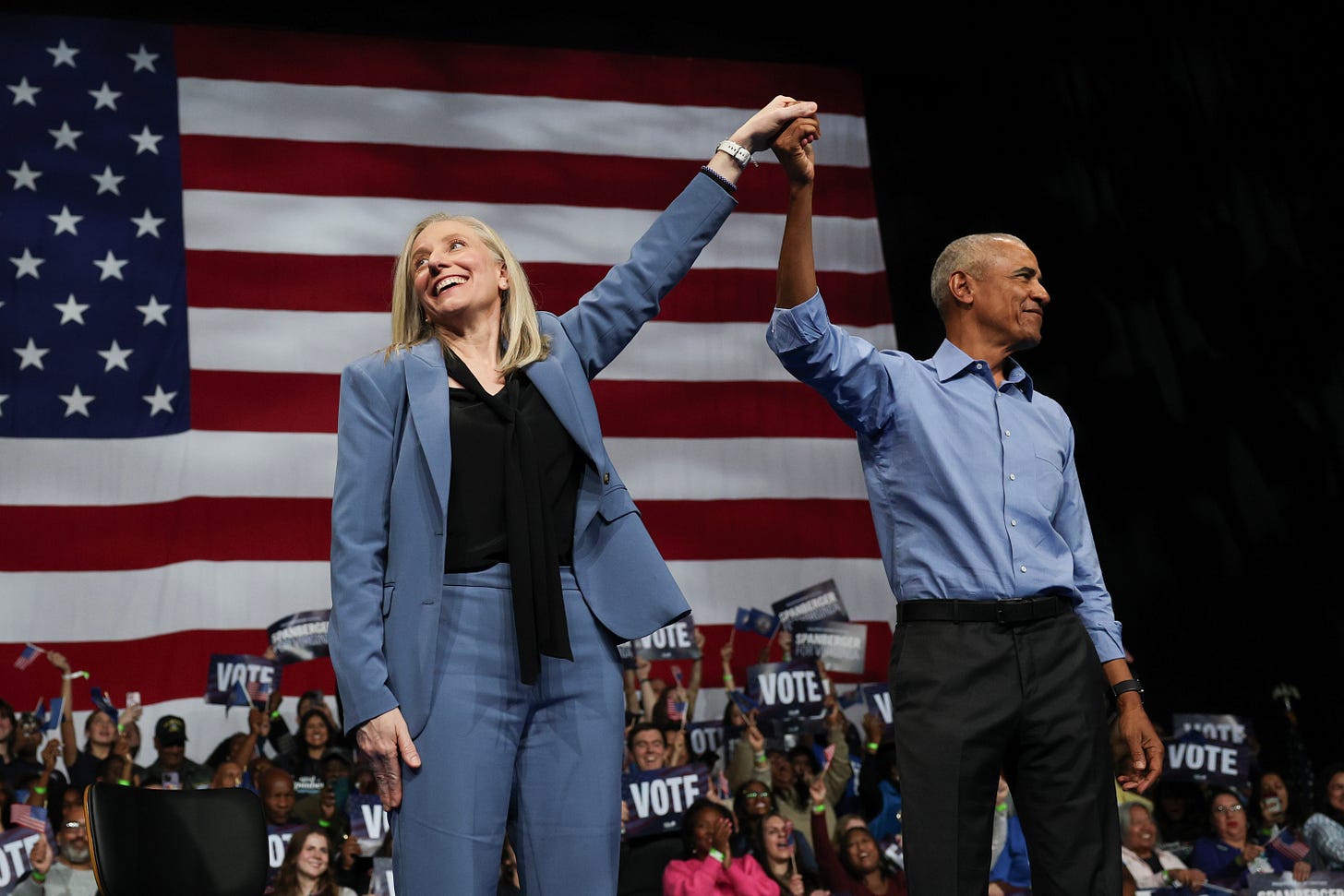Virginia and New Jersey can show that Trump isn't inevitable
MAGA might be in for an ass-whuppin' on Tuesday.
Public Notice is supported by paid subscribers. Become one ⬇️
“Republican Youngkin wins Virginia governor’s race in blow to Democrats,” ran NBC’s headline. “Key takeaways from bad night for Biden” announced the BBC. “Glenn Youngkin’s victory is a warning for Democrats,” the New Yorker intoned ominously, while the AP added that the evening was a “major political turnabout in a state that had been trending increasingly blue.”
In November 2021 the press analysis was unified — Glenn Youngkin’s victory in the Virginia governor’s race was a major setback for Democrats, indicating that President Biden’s handling of covid-era school closures and support for LGBT youth had alienated the public. A Trumpish platform without Trump was declared broadly successful and journalists predicted a Democratic midterm wipeout.
Many of these kneejerk judgements don’t hold up in retrospect. Democrats had a very strong midterms in 2022 and, longer term, Trump unfortunately was not gone from the Republican Party or public life. But the press was at least fairly consistent.
Strong out-party showings in off-year Virginia and New Jersey contests are often read as a negative referendum on the president in power. In that tradition, a powerful performance this Tuesday could help break the feverish doom loop of Democratic self-recrimination and elite capitulation which has contributed to our flatulent descent into fascist thuggery, hate, and mass death.
As we approach Tuesday’s election, then, those who hope for some traction against Trump face two questions: Will anti-Trump forces have a good night? And, will it matter?
Tailwinds
As the legendary polling analyst Yoda wisely notes, the future always in motion is. Still, with that caveat, it’s hard to avoid the conclusion that Tuesday looks pretty darn good for Democrats.
Trump’s popularity is the lowest in his career by some metrics. The Economist last week showed him a record 19 points underwater, lower than he ever was in his first term, with 39 percent approving and 58 percent disapproving.
The president’s steep decline since January has been reflected in a series of ugly special election results for Republicans, including the three biggest overperformances ever against Trump since his first election in 2016. In one eye-popping result in northern Virginia in September, Democratic Rep. James Walkinshaw beat Kamala Harris’s 34 point margin by a whopping 16 points, winning 75 to 25 percent.
That sounds like a huge warning sign for Republicans in the state. And sure enough, former Democratic Rep. Abigail Spanberger leads Republican Winsome Earle-Sears by a hefty 10 point margin in a recent poll of the Virginia’s governor’s race. The lieutenant governor’a race is much closer (Democratic candidate Ghazala Hashmi leads Republican John Reid by just a couple points) and Democrat Jay Jones’s campaign for attorney general has floundered badly after text messages surfaced in which he fantasized about political violence. One poll shows Jones down 46 to 38 percent to Republican incumbent Jason Miyares, though other models suggest the race is closer than that.
Democrats hold narrow leads in the Virginia Senate (21-19) and House of Delegates (51-48). Only the latter is being contested this year, and Democrats are almost certain to hold the majority, not least because they’ve been heavily outspending Republicans. If Spanberger wins in a rout, they could expand that substantially — possibly by as many as 13 seats. A supermajority might almost be in reach if Republicans completely collapse.
New Jersey’s governor’s race looks closer than Virginia’s, perhaps reflecting the fact that former Assemblyman Jack Ciattarelli is a stronger Republican candidate than Virginia’s clownishly MAGA Winsome Earle-Sears.
But going into the stretch in New Jersey, Rep. Mikie Sherrill looks to be pulling away. All recent polls show her ahead, with a lead of between two and eight points. As for the legislature, Democrats hold 52 of the 80 General Assembly seats, and most aren’t expected to be competitive.
The other big race is the New York City mayoral contest, where Democrat Zohran Mamdani is currently crushing both Republican Curtis Sliwa and Independent former Democrat and disgraced centrist Andrew Cuomo. Cuomo’s campaign has been disgustingly racist, and he’s and he’s been coordinating with Trump, so a solid defeat would be especially satisfying.
Republicans have also launched a long shot (but very well-funded) effort in Pennsylvania to block retention of three Democratic justices to the state Supreme Court. And in other states voters are being presented with a number of important ballot measures.
The chief of these is California’s Prop 50, which would allow the state to redistrict in response Trump’s election thievery in Texas and elsewhere. Current polling suggests it is going to pass overwhelmingly.
There’s also a dirty-pool GOP measure in Maine designed to throttle mail-in voting in the state. Democratic opponents have significantly outraised the GOP, which seems like a good sign, though there’s scant polling on the measure.
It’s not over until it’s over, obviously, but right now it looks like the plausible outcomes on Tuesday range from a solid GOP defeat to a resounding wipeout.
Will it matter?
It feels like eons ago, but it’s worth remembering that Trump had bad off-year results in his first term too. In 2017 he managed to lose a Senate race in Alabama, of all places. Yet he’s still here and in a lot of ways more powerful than ever.
Will a setback this week — even a brutal one — really make a difference? Given the grotesque genuflection of the oligarchs, will the media even cover it as a Trump loss?
People are leery of hope in the current climate, and for good reason. But elections still matter, and even small strategic victories can have real consequences.
Winning Prop 50 in California will help Democrats in midterms, despite Republican cheating. Democrats holding the Virginia House will allow that state to fire back at Republican gerrymandering. Spanberger’s election will help ensure Virginia continues to be a vital abortion access point for women and pregnant people across the south. Preserving mail voting in Maine will make sure that elderly, disabled, and rural people can continue to access ballots. Preserving the Supreme Court in Pennsylvania is vital to protect rights and voting in the state.
Local election wins won’t defeat the rising tide of racism, but protecting people is good in itself and creates the possibility of larger victories later.
Victories also remind elites that Trump is not some sort of eternal expression of the American spirit and volk who can never be denied. Losing Virginia, New Jersey, Prop 50, and watching a victorious Mamdani articulate a compelling vision of multiracial democracy means that mainstream media will have to at least briefly acknowledge that MAGA fascism is not inevitable. Corporations, universities, and media empires that have been acting as if Trump is a rightful king who will reign forever will be confronted with a sweeping rejection of his person and politics.
Voters, too, will be reminded that, despite Trump’s best efforts, they still do have the power to elect their own representatives and to work each election, and each day, for the America they’d like to see.
Things remain not great. But on Tuesday, millions of people will have a chance to vote for something a little better. Nothing could make Trump less happy.
That’s it for today
We’ll be back with more tomorrow. If you appreciate today’s PN, please do your part to keep us free by signing up for a paid subscription.
Thanks for reading, and for your support.







I am so hopeful about tomorrow. This tug of war is killing us. I want every Republican candidate to lose so that MSM has to start speaking the truth. They need to stop lying to their customers… that’s what we are… customers…. Thanks, Noah, for this calming post.
I am quietly hopeful about Tuesdays results but reckon I'd be more interested reading about the significance of what the actual results mean rather than speculation about what they may be.